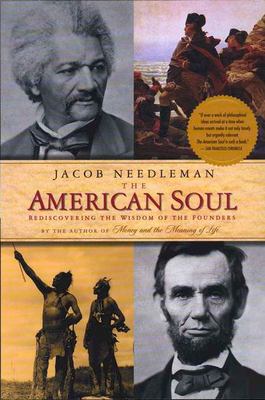 I woke up Sunday morning, July 1, to the voice of National Public Radio’s Krista Tippet posing gentle questions to philosopher Jacob Needleman on his book American Soul: Rediscovering the Wisdom of the Founders. The segment entitled “The Inward Work of Democracy” explained how every achievement of American freedom resulted from a spiritual advance of conscience.
I woke up Sunday morning, July 1, to the voice of National Public Radio’s Krista Tippet posing gentle questions to philosopher Jacob Needleman on his book American Soul: Rediscovering the Wisdom of the Founders. The segment entitled “The Inward Work of Democracy” explained how every achievement of American freedom resulted from a spiritual advance of conscience.
Needleman, a native of Philadelphia, the cradle of American freedom, confessed that he came only late in his life to meditate on the spiritual meaning of America. He related how all through his career he endeavored to make connections between the great religious traditions and the political, cultural, sociological problems of the day. His dialogue with Tippet that morning centered on the question “What is America?” What I found remarkable was how much Needleman found in the life and thought of the Founders that Anglo-American philosophy since World War II made unfashionable: modesty and restraint in public office, the balance between individuals and community, conscience understood as a higher calling rather than self-realization, the need for inner-freedom among people who would rule themselves.
The following Monday I discovered Father Jim Martin had left in my mailbox a new release, Logan Mehl-Laituri’s Reborn on the Fourth of July: The Challenge of Faith, Patriotism and Conscience, an autobiographical account of an army veteran turned noncombatant conscientious objector, who now lectures about veterans issues and Christian perspectives on militarism and nationalism for the Centurion Guild, a group he co-founded for other veterans wrestling with issues of “faith and service.”
Lying on the floor of my room is also Stephen Prothero’s American Bible, a much-needed collection of historical documents meant to remedy the ignorance of American civic thought among our contemporaries. but also as food for the minds and drink for the souls of those grown cold and cynical about American public life today.
These serendipitous happenings played on my mind, prompting me to ponder the spiritual lessons of the American experience. The Fourth of July will be weeks gone when this column appears in print, and even that other feast of freedom, Bastille Day, will have passed by as well. We are, however, posting it online for Independence Day. But doing a national account of conscience seems not just right for the season, but necessary in these times.
Professor Needleman offers some starting points: the republican modesty of George Washington in stepping down from command of the Continental Army and then from the presidency; Jefferson’s penning of ideals he didn’t live up to himself and his proposal of a bill of rights; the religious sense of equality motivating Quakers in the anti-slavery movement; the recognition of national failings by Frederick W. Douglas and Abraham Lincoln, as well as Lincoln’s magnaminity—“with malice toward none, with charity for all’’—and Walt Whitman’s hope for America.
As an American Catholic, I look back with gratitude to John Carroll and the first clergy of the United States who were able to embrace the republican virtues of the new nation without defensiveness. Naturally I also look to John Courtney Murray who articulated a rapprochement between the later immigrant church and the American experience. From Murray, too, and his traditional conservative interlocutors I drew commitment to “ordered liberty” as integral to democracy, and especially to dialogue as essential to a healthy democracy, genuine theological development and a truly catholic church.
As an American, I also look to Josiah Royce, whose philosophy of loyalty articulates the religious quest of the American individual for meaningful, committed freedom in community. His idea of “the Great Community” later inspired Martin Luther King with an inclusive vision of the civil rights struggle and the destination of the American journey.
Drew Christiansen, S.J.








Book on the floor of your bedroom?.I am the sloppiest of all but the only book on the bedroom floor is the one I read before I turn out the lights.
The key task as I see it is one best suited to the jesuits.
It is one of discernment.It is in discernment where the Jesuits earn their keep.
The AMERICAN experiment is groundbreaking historically but needs to be kept in check.Is it based on certain principles or just an indiscriminate embrace of the zeitgest?
The question of freedom will be pushed to the end but i Think it is fair to say that the American expression will ultimately end in an existential knot the like of which Kierkagaard fretted over.
The whole world can still learn from America .I have lived in all continents and the country you inhabit is for good and bad ,different.
It has the opportunity to push us forward .The rest are tired and jaded.
As an event nothing compares to Jesus and America will only be significant as long as it remians true to it's own revolution, a peculiar revolution.